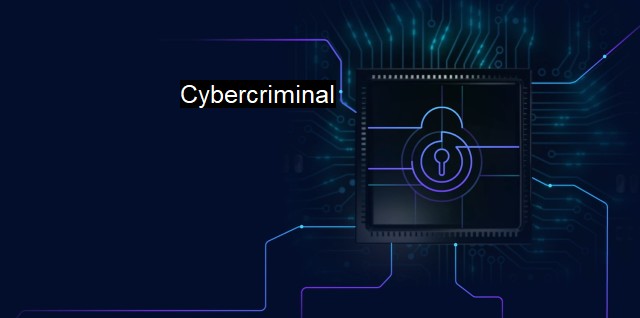What is Cybercriminal?
Cybersecurity and Antivirus: Understanding the Growing Threat of Cybercriminals Exploiting Vulnerabilities in Online Activities - A Deep Dive into Cybercrime and Motivations of Perpetrators
Cybercriminals are individuals or groups that use technology, particularly computer systems, to commit malicious activities practically or for personal benefits. They actively steal, alter, or destroy data, often by infiltrating a secure network through the internet in the context of cybersecurity and antivirus. They may be professional criminals, state-sponsored hackers, or even misguided teenagers.Now let's delve deeper into identifying the characteristics that typify the activities of a cybercriminal. Predominantly, these criminals specifically target systems software, sensitive user data- including financial information, personal identification data, critical corporate data, and essentially any form of data that can be used to extract some level of benefits for them. Other prominent activities associated with cybercriminals involve launching viruses or malware, disrupting networks, defrauding users through phishing scams, and even engaging in digital piracy.
A fundamental understanding of the cybersecurity environment informs us that the activities seen amongst cybercriminals today have been steeply evolving. In very recent years, the growth and advancement of technology have revolutionized the world. in this sphere that largely derives its drive from sophisticated subdivisions of technology like artificial intelligence, machine learning, and data science, cybercrime is a concurrent grim reality which grows at the same pace, if not more. Cybercriminals constantly modify their techniques, tools, and approaches to bypass security measures, this narrates just how dynamic and complex the world of cybersecurity is shaping to be.
Antiviruses are critical in preventing the misadventures of cybercriminals in the world of technological advancements. Just as it's essential for us to have a physical security system to prevent break-ins, it's crucial to have an antivirus software, as they are like the "gatekeeper" of our device. Once the system is installed, it signals an alert if there's any suspicion or danger of a virus or malware, thereby deterring unsolicited access to sensitive information by cybercriminals and nipping this threat in the bud - assuming that the antivirus is diversified enough to detect new kinds and combinations of viruses.
In the present age of widespread use and dependency on the internet and digital services, measures to curb cybercrime have seen to have been on the upswing. Antiviruses provide an essential line of defense against harmful cyber threats. no defense strategy is foolproof. Anti-virus software may not detect a novel kind of virus, as it may not have been calibrated or updated to perceive it as a threat. Consequently, it again circles back to the continually evolving nature of both—cybercrime and tools to combat it.
The progression of information technology brings about its own set of cybersecurity compliance regulations and ethical guidelines. These regulations become necessary given the high-stakes nature of the context, where potential data leaks or system compromises can lead to substantial financial losses or damage to the repute of an organization.
The reality of cybercrime creates an urgent need for constant progression in cybersecurity measures. Even with stringent and thorough protocols in place, the safety provided can be minimal due to the continually changing landscape of malicious technology techniques developed by cybercriminals. This unpredictability, coupled with the potential damage at stakes, further iterates the necessity for ongoing research and development of refined security systems and mechanisms.
a cybercriminal is the absolute antithesis to all concepts of a secure, highly robust, technologically-advanced cyber ecosystem. The struggle for control in the world of cyber-frauds and paybacks that would mirror thrilling science-fiction plots are a testament to the growing need and significance of solid, ever-evolving, fool-proof cybersecurity systems and procedures. Can we completely eradicate cybercrime? Likely not, due to the self-evolving sphere of technology that will always have some or the other loophole that abusive entities with an asymmetric advantage will exploit. what we can do is foster a resilient and secure cyber culture where the potential impact of any cybercrime is radically minimal.

Cybercriminal FAQs
What is a cybercriminal?
A cybercriminal is a person who uses technology to commit illegal activities like stealing data, breaching networks, infecting systems with malware, and conducting phishing attacks.What motivates a cybercriminal?
Cybercriminals are generally motivated by financial gain, political motives, or personal grudges. Some of them operate as lone wolves, while others work in organized groups.What are some common cyber threats that cybercriminals use?
Cybercriminals use various techniques such as phishing, ransomware, malware, social engineering, and DDoS attacks. They can compromise sensitive data, steal confidential information, and cause financial loss to individuals or organizations.How can I protect myself from cybercriminals?
You can protect yourself from cybercriminals by using strong passwords, updating your software regularly, avoiding suspicious emails or links, enabling two-factor authentication, and using reliable antivirus software. It's also important to keep yourself informed about the latest cybersecurity threats and best practices.Related Topics
Cybersecurity threats Malware detection and removal Phishing attacks Ransomware protection Social engineering tactics
| | A | | | B | | | C | | | D | | | E | | | F | | | G | | | H | | | I | | | J | | | K | | | L | | | M | |
| | N | | | O | | | P | | | Q | | | R | | | S | | | T | | | U | | | V | | | W | | | X | | | Y | | | Z | |
| | 1 | | | 2 | | | 3 | | | 4 | | | 7 | | | 8 | | |||||||